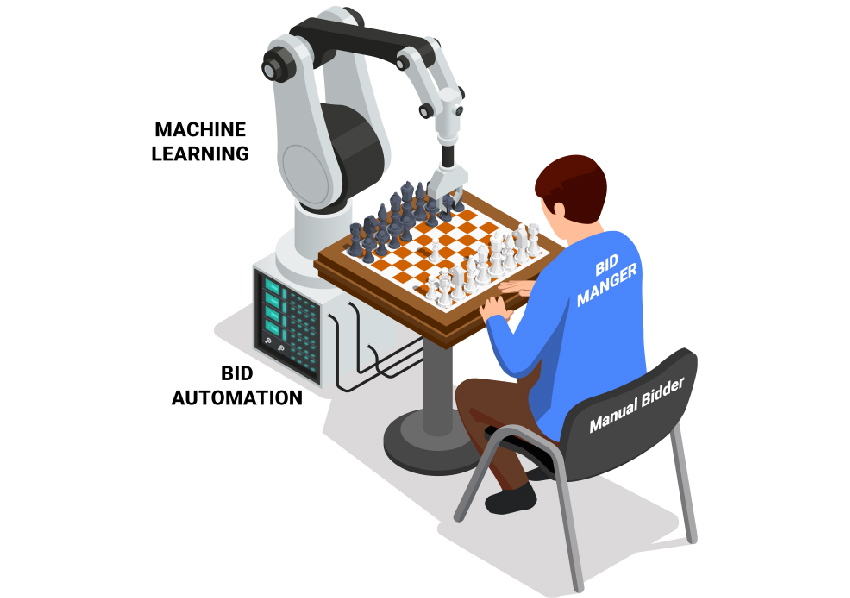
This series of articles takes a look at PPC automation available today, both how it works and associated controversies. We’ll share the high points of what we’ve learned, including the positive and less positive angles.
Digital advertisers are already benefiting from the recent arrival of automation within pay-per-click (PPC) advertising campaigns. Yet, Automation has become a relatively controversial topic within the PPC community.
There is a sizable anti-automation contingent of veteran PPC pros. We’ll take a quick look at what their concerns are, and how this new PPC technology is playing out.
Artificial Intelligence vs. Machine Learning
There is natural excitement from computer science enthusiasts and professionals directed toward an embryonic technology known as “Artificial Intelligence”, or “AI”. Components of AI have been incubating since the 1970’s, and are the subject of many books, articles, and published academic papers.
AI is now reaching early stages of the famous “J curve” of mainstream awareness, for example on cable news networks. Maria Bartiromo recently hosted a cable business network special report on AI, spending 60 minutes interviewing thought leaders including Bill Joy, Billionaire Siebel founder Tom Siebel (now Chairman of AI firm c3.ai), and touring the IBM-MIT AI lab to explore the topic.
German-American Billionaire, PayPal co-founder, and tech-savvy investor Peter Thiel has observed, that in terms of importance AI is a critical military technology with immense, strategic national defense implications.
Hype Versus Reality
When major new technologies at the brink of arrival are often hyped relentlessly. But sometimes the arrival of a new technology takes longer than expected, or never happens at all.
The emergence of artificial technology is a real thing. It’s starting to happen now, and is a very significant development, on several levels. It will indeed bring about major strategic challenges in military defense. AI will change the nature of work by extending the reach of computing technologies into tasks previously performed by humans, disrupting workforces globally. Some pundits on the extremes, are even decrying “the coming end of work”.
That’s far too extreme in our view, but there are both positive and negative implications. So let’s take a look at what’s known, what’s unknown, and what is best described as a “known unknown”!
What is AI?
The AI The term “Artificial Intelligence” itself is a bit misleading as it implies that somehow, machines have been taught to become autonomous, thinking machines. In other words, that they have acquired sentient intelligence — a self awareness couple with an ability to think about themselves, diplay a sense of judgement, morality…and the other qualities that uniquely distinguish humans.
Here’s the issue with that. To this date, there is no such thing on the planet Earth. Sentient intelligence has not been somehow instilled into computational devices or machines. So the AI of “Science Fiction” remains just that — fiction.
Not that machines with sentient intelligence couldn’t, or won’t arrive in the future. But that’s beyond the scope of our interest, and this discussion.
So when you hear about “AI in PPC”, that’s what engineers tend to call “hand waving” or “marketing hype”. So there’s your first controversy. AI technology has not arrived in PPC advertising campaigns.
What is happening then? The answer is machine learning.
Machine Learning
What’s more relevant here, and what’s been happening that’s dramatically impacting PPC relates to a class of computing capabilities known as “Machine Learning”.
Machine Learning was defined by Arthur Samuel of IBM, credited as the first person to publish on the topic (1959). He introduced it as “a subfield of computer science that gives computers the ability to learn without being explicitly programmed”. His first application was “to verify that a computer can be programmed so that it will learn to play a better game of checkers than the person who programmed it”.
Machine learning involves self-learning by a software program, as part of an algorithm. Typically statistical models are used to detect patterns and improve performance based upon data and empirical information.
Bid Management
Historically one of the most time-consuming and arduous tasks required in managing PPC campaigns has been to manually adjust the bids in PPC campaigns. This often needs to be done rather frequently, in order to stay in sync with the many shifts in supply and demand associated with PPC auctions – bids for ad space associated with individual campaigns and keyword matches.
There are numerous machine learning algorithms that are well suited for this task. We’ll take a look at them in this series, comparing and contrasting their capabilities, strengths and weaknesses. Microsoft and Google both offer the following forms of PPC machine learning algorithms (MLA), although their implementation and behavior differ greatly:
- Manual Bidding: the baseline (manual bidding)
- Enhanced cost per click (e-CPC)
- Ads Maximize Conversion Volume bidding (MCV)
- Target CPA bidding (TCPA)
- Maximize Return on Ad Spend (ROAS)
There are other forms of automated bidding, which we’ll introduce later. Those listed are the “cream of the crop” and most frequently utilized PPC MLA’s at the current time.
Next In this Series On PPC Automated Bidding
In the next articles of this series, we’ll begin to address each of these types of automated bid control and look at their when and where where they can be useful, and where they have limitations. We’ll also take a look at machine learning within the ads themselves (responsive ads), and more forms of automated bid control.





